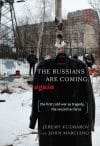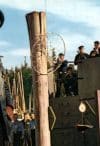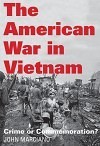
Karl Marx famously wrote in The Eighteenth Brumaire of Louis Napoleon that history repeats itself, “first as tragedy, then as farce.” The Cold War, waged between the United States and Soviet Union from 1945 until the latter's dissolution in 1991, was a great tragedy, resulting in millions of civilian deaths in proxy wars, and a destructive arms race that diverted money from social spending and nearly led to nuclear annihilation. The New Cold War between the United States and Russia is playing out as farce—a dangerous one at that. The Russians Are Coming, Again is a red flag to restore our historical consciousness about U.S.-Russian relations, and how denying this consciousness is leading to a repetition of past follies. | more…

The present Russia panic follows an entire century of fearmongering and “threat inflation,” dating to the Russian Revolution, that has long served the interests of the U.S. military-industrial complex and security state. It has had little to do with either Russian or American realities, which have been consistently distorted. | more…

The Vietnam War was an example of imperial aggression.… Imperialism ultimately enriches the home country’s dominant class. The process involves “unspeakable repression and state terror,” and must rely repeatedly “upon armed coercion and repression.” The ultimate aim of modern U.S. imperialism is “to make the world safe” for multinational corporations.… U.S. imperial actions in Vietnam and elsewhere are often described as reflecting “national interests,” “national security,” or “national defense.” Endless U.S. wars and regime changes, however, actually represent the class interests of the powerful who own and govern the country. Noam Chomsky argues that if one wishes to understand imperial wars, therefore, “it is a good idea to begin by investigating the domestic social structure. Who sets foreign policy? What interest do these people represent? What is the domestic source of their power?” | more…

A devastating follow-up to William L. Griffen and Marciano’s 1979 classic Teaching the Vietnam War, The American War in Vietnam seeks not to commemorate the Vietnam War, but to stop the ongoing U.S. war on actual history. Marciano reveals the grandiose flag-waving that stems from the “Noble Cause principle,” the notion that America is “chosen by God” to bring democracy to the world. The result is critical writing and teaching at its best. This book will find a home in classrooms where teachers seek to do more than repeat the trite glorifications of U.S. Empire. It will provide students everywhere with insights that can prepare them to change the world. | more…


